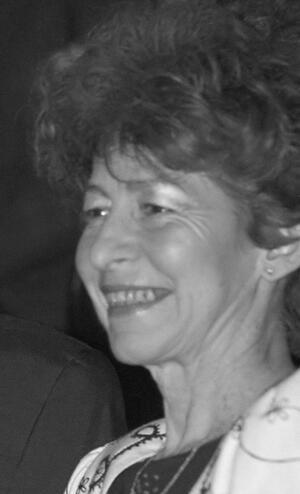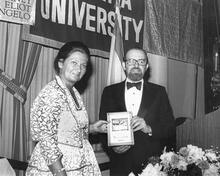Marceline Loridan-Ivens
Marceline Loridan-Ivens, an activist of the heart, was a writer, filmmaker, producer, and actress whose experience of the Shoah, as a fourteen-year-old girl in Birkenau, marked the rest of her extraordinary life and work. As one of the most eloquent advocates for humanity and the power of memory, her reflection on identity as a Jewish woman is everywhere, from her committed documentary work with Jean Rouch and with her husband Joris Ivens, to her sensitive and moving writing of philosophical memoirs, to her writing and direction of what has become a classic of Jewish cinema, La Petite Prairie aux Bouleaux.
While Marceline Loridan-Ivens is known around the world for the superb political documentaries she codirected with her husband, the Dutch filmmaker Joris Ivens (1898–1989), her status as one of the most eloquent advocates for humanity and for the power of memory makes her a vital example of strength and resilience amid devastating life experiences. Loridan-Ivens was one of the last remaining voices of the Shoah, writing and speaking until the very end of her life. Her writings provide very personal, profoundly moving reflections on her identity as a Jewish woman, and of the necessity to survive, remember, and speak. She became one of the most powerful advocates for the memory of the Shoah due to her participation in countless memorials, panels, and films and through her own writing. She was an activist of the heart, speaking with enthusiasm and purpose to a large following that included younger generations, with whom she held weekly salons in her apartment. Her single feature fiction film, A Birch Tree Meadow/La petite prairie aux bouleaux (2003), made when she was 75 years old, established her as a significant voice in Jewish cinema as well.
Surviving the Holocaust
Born Marceline Rozenberg in Épinal, France, on March 19, 1928, Marceline Loridan-Ivens was among the Jews already in hiding when she was arrested with her father Szlama in the Vaucluse in 1943. She was only fourteen when she was deported to Birkenau, where her father perished and where she forged a lifelong friendship with fellow internee Simone Veil (née Jacob). So consistent was this bond that when Simone Veil was buried in the Pantheon in 2018, Loridan-Ivens commented that she felt that all the girls of Birkenau were in attendance. She returned to France in July 1945. Sometime in the late 1940s or 1950s, she married Robert Loridan; the two subsequently divorced.
Loridan-Ivens’ experience as a young Holocaust survivor made her the principal figure in Jean Rouch and Edgar Morin’s 1959 landmark film, Chronique d’un été (Chronicle of a Summer). This film was a broad panorama of Parisian daily life in the summer of conflict in Algeria and the Congo, and Loridan’s presence in it reflected the emergence of Holocaust witnessing as a way to combat quotidian patterns of forgetfulness. Embedded in this early postwar film of daily life was Marceline’s recollection of the last time she saw her father, brutally separated from her in the camp; she returned to this subject decades later in her penultimate book, But You Did Not Come Back (2016), written as a letter to the father she never saw again. Chronique’s blend of intimacy and committed politics shaped Loridan-Ivens’ early career as a journalist and television producer, and in 1962 she codirected the provocative and controversial Algérie année zéro with Jean-Pierre Sergent. Chronique also inaugurated both the Cinéma Vérité/documentary style of the French New Wave and Loridan-Ivens’ close working friendship with Rouch, an outstanding ethnographic filmmaker, a relationship that lasted over half a century until Rouch’s sudden death in 2004.
Marriage and Working Relationship with Joris Ivens
By the time Loridan met Joris Ivens in 1963, he was already a celebrated Leftist documentary and experimental filmmaker with a long list of international activist projects to his credit (including The Spanish Earth, 1936; Power and the Land, 1940; Indonesia Calling, 1946; and A Valparaiso, 1960). Their thirty-year age difference seems to have enhanced rather than detracted from their relationship. Their marriage and highly productive collaborative career ended only with Ivens’s death in 1989. Among their most famous documentaries are Le ciel, la terre (The sky, the earth, 1965), about the origins of the war in Viet Nam; The 17th Parallel, Le peuple et ses fusils (The people and their guns) and La guerre populaire au Laos (The working-class war in Laos), all made in 1968, in conjunction with the North Vietnamese, and about the Laotian popular struggle); and the highly acclaimed series of twelve films about China, How Yukong Moved the Mountains (1976). Political commitment and social conscience became the hallmarks of their work.
In 1985 Loridan-Ivens began collaborating with Elizabeth D. Prasetyo on a screenplay for a documentary about Ivens’s life and work, A Tale of the Wind (1988), which critic Jonathan Rosenbaum calls “a mind-boggling documentary full of magic and fantasy that beautifully encapsulates the career that preceded it.” Loridan subsequently created the Joris Ivens Foundation in Holland and the Association des Amis de Joris Ivens in France, both committed to human rights and social justice.
Loss and Remembering
Loridan-Ivens’ public life was framed, start to finish, by the intimate, searing memory of loss, a yearning to survive, and a commitment to remembering. That sense of social responsibility, bound up in the most unspeakable trauma of the past, remained with her throughout her life. She became an icon of indomitable courage and compassion and, at the same time of friendship and humor. Simone Veil recalled how Loridan-Ivens always found a way to make her fellow Birkenau inmates laugh, a capacity for joy that this diminutive ball of energy with the wild halo of red hair carried with her throughout her life.
In 1993 Loridan-Ivens began working on a project that had been in her mind most of her life and that would take another twenty years to complete: the scenario for La Petite prairie aux Bouleaux (A birch tree meadow), her first (and only) feature-length fiction film and the first film ever shot at Birkenau. Starring Anouk Aimée as an Auschwitz-Birkenau survivor in her early seventies who returns to the camp in an attempt to banish haunting memories of the past, the film is ultimately uplifting in its hopeful message of human connection. In response to the question “Why so late?” Loridan-Ivens answered, “I have let so many years pass before bringing my own contribution to that living memorial of the Holocaust made up from the memories of those who survived it, simply because for all that time I was incapable of doing it. As a person, like so many other survivors, [I thought] it was better to remain silent. But today, as an artist, although I truly fear that I don’t have the capacity, I know I have the duty to express myself and add my voice to those of people who have had the courage to speak before the death of the last survivor sends the camps into the realm of History once and for all.” With this exquisitely meditative film that redefines the categories of documentary and fiction, Loridan-Ivens truly created what she called “A history lesson, full of sensitivity, so we never forget, for our generation and for future generations.”
Trailer for Marceline, documentary about French writer, filmmaker, actress, and Producer Marceline Loridan-Ivens. Directed by Cordelia Dvorák.
In 2008, Loridan-Ivens published an autobiography (written in collaboration with journalist/novelist Elisabeth D. Inandiak) entitled Ma Vie Balagan. (Loridan explains, “Balagan is a sort of disorder, disorganization, chaos. Order in disorder…Order for one is balagan [disarray] for another”). With her signature verve, humor, and political acumen, she takes the reader from her childhood through the experience of the Shoah, her documentary work with Ivens, up to the present. This spirit carried to her final book, L’Amour Après (Love after, 2018), which deals with the complex issues of sexuality after trauma. In 2019, German filmmaker Cordelia Dvorak made a documentary about Loridan, Marceline. A Woman. A Century, a portrait that vibrates with the energy and rebellious spirit of this woman whose life spanned the major events of the twentieth century.
Filmography
Chronique d’un été, 1959.
Algérie année zéro, 1962.
Europort Rotterdam, 1963.
Le ciel, la terre, 1965.
Le 17ème parallel, 1968.
Le peuple et ses fusils, 1968.
Comment Yukong déplaça les montagnes, 1971–1976.
Une histoire de vent, 1988.
La petite prairie aux bouleaux, 2003.
SELECTED WORKS:
Dix-septième parallel: la guerre du people (with Ivens). Paris: Editions Français Réunis, 1969.
Ma vie balagan. Paris: Robert Laffont, 2008.
Et tu n’est pas revenue (with Judith Perrignon). Paris: Grasset, 2015.
L’Amour après (with Judith Perrigon). Paris: Grasset, 2018.
As Actress
Golem, l’esprit de l’exil, 1992.
Peut-être, 1999.
As Herself
Comme un Juif en France, 2007.





